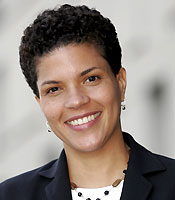As a part of our efforts to educate the public about the scholarship that is being done here at the Avery Research Center here is a post written by the Public Historian, Dr. Robert Chase, about his upcoming conference.
In the Fall, Dr. Chase presented his research on the history of the prisoners’ rights movement and the construction of the carceral state to three conferences: Rutgers University’s conference on “From Post Modern to Post Blackness”; University of Colorado, Boulder’s “Sunbelt Prisons and the Carceral State: New Frontiers of State Power, Resistance, and Racial Oppression” symposium; and at the Western History Association’s annual meeting.
Sunbelt Prisons and the Carceral State: New Frontiers of Racial Oppression, State Power, and Resistance

Conference Website
At the invitation of the Clements Center for Southwest Studies, Dr. Chase is presently coordinating a symposium and co-editing an anthology titled, Sunbelt Prisons and the Carceral State: New Frontiers of Racial Oppression, State Power, and Resistance. This anthology and interdisciplinary symposium brings together scholars of the state and state formation, borderlands, Chicano/a history, the Black Power movement, politics and social movements. It is co-sponsored by the Clements Center for Southwest Studies of Southern Methodist University and by the Center of the American West of the University of Colorado, Boulder. The Clements Center has co-sponsored ten such symposiums, each of which has resulted in a published groundbreaking anthology based on a specific theme or field of pioneering historical studies.

Michelle Alexander (image from http://moritzlaw.osu.edu/faculty/bios.php?ID=2)
Declaring that today’s racially disproportionate rates of incarceration represent “a New Jim Crow,” legal scholar Michelle Alexander has advanced the argument that “We have not ended racial caste in America; we have merely redesigned it.” Historians should have something important to say about whether our age is indeed a “New Jim Crow,” and the history of region, geography, and space plays a crucial role in this reconsideration. Dr. Chase takes up Professor Alexander’s charge by considering the historic role of the American Southwest and Borderlands in shaping today’s contemporary era of mass incarceration and the construction of what many historians now call the “carceral state.”
Building on the innovative fall 2011 symposium held at the University of Colorado, Boulder’s Center of the American West, the spring 2012 symposium (March 22-24) offers a different platform than the academic seminars of years past. This year’s seminar features a public history event and public policy symposium where some of the nation’s leading scholars, politicians, civil rights attorneys, formerly incarcerated activists, journalists, and community organizers in Dallas will collectively discuss the historical roots of mass incarceration and problems, possibilities, and potential solutions. The day-long event includes a series of four roundtable panels that will include dialogue with the audience. The final panel of the day will create a space for academics, students, and faculty to exchange ideas and experiences with those who have experienced incarceration as well those who have challenged the problem of mass incarceration through the legislature, the courts, and grass-roots activism. The day’s final panel will include Congresswoman Eddie Bernice Johnson (invited); Ernest McMillan – civil rights veteran and formerly incarcerated activist; Ray Hill – formerly incarcerated activist and host of “The Prison Radio Program;” Bill Habern – long-time civil rights and criminal defense attorney; and Lisa Graybill – legal director of ACLU, Texas.
Below is a recap of a conference that Dr. Chase attended in October 2011.
Narratives of Power-Center for Historical Analysis, Rutgers University
From Black Modern to Post Blackness: A Retrospective Look at Identity.”

Conference Schedule
Conference Program
This conference addressed the changing narratives of power in a time of historical transformation. Inspired by the election of Barack Obama, media pundits, scholars, and the public more broadly are asking how this momentous shift in the United States’ polity has changed the way that we understand the American past and present. Given the history of New World slavery, segregation, and disfranchisement, the election of the country’s first black president has led many to reflect on the operation and exercise of power in the United States. Although his election has been widely celebrated by supporters, Barack Obama’s campaign highlighted many of the growing fault lines and demographic shifts within the American public. Shifting parameters of identity created both the opportunity for new coalition and division. One of the most striking elements of the election was the remapping of the U.S. electorate based on multiple vectors of identity and voting behavior. The mass media focused an unprecedented level of attention on region, gender, intergenerational change, immigration status and linguistic designation as analysts stressed the increasing power of new political constituencies.
Using both President Obama’s campaign and election as starting point, we plan to use this topical theme as an opportunity to create an expansive, interdisciplinary dialogue about the intersection, overlap, and conflict across different channels of power and identity, including race, gender, sexuality and class. We have chosen to include narrative because as decades of scholarship questioning the interrelation of author and subject have shown, an interrogation of how the story is told, by whom, and to what end is essential to the process of understanding power.


Recent Comments